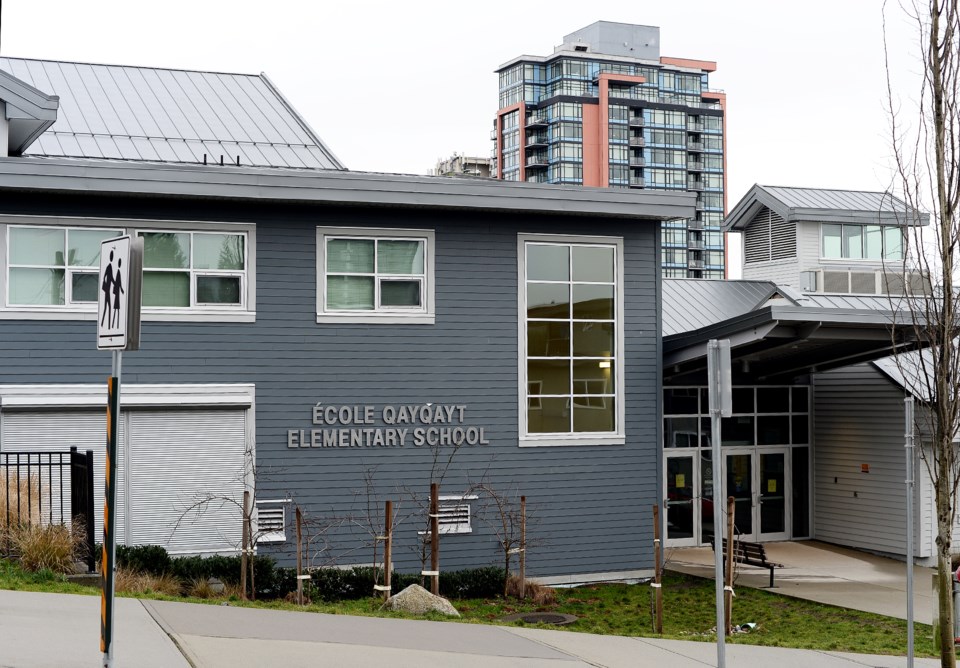Rapid population growth plus lack of land equals overcrowded schools.
It’s an equation the New Westminster school board is all too familiar with, as School District 40 grapples with the problem of how to fit all the city’s kids into their neighbourhood schools.
The challenge is particularly acute in the city’s core, where two elementary schools are strained past capacity: École Qayqayt Elementary School, downtown, and Lord Kelvin Elementary School, near Moody Park.
The space shortage is so acute at Qayqayt, in fact, that the district is eyeing the possibility of a lottery system for kindergarten students in future years.
Solving that problem will mean adding another elementary school — something the district is trying to do.
Each year, school districts submit capital planning requests to the B.C. Ministry of Education outlining their needs for new land and buildings. For 2022/23, SD40 asked for $222.6 million, with $105.7 million of that designated for new schools.
Its top priority was a new elementary school for kindergarten-to-Grade 5 students in the Fraser River zone (the central to western part of the city), at a cost of $47.6 million. Also on the list was $58.1 million to build a second middle school in the Fraser River zone.
It didn’t get funding for either. In fact, it didn’t get any funding for major capital projects.
The provincial government has acknowledged the need for a new elementary school in New West, with the Ministry of Education supporting a concept plan for the new Fraser River elementary school.
But completion of that new school is at least five years down the road.
So what should the new school board do?
Candidates running for the seven trustee spots in the Oct. 15 municipal shared their thoughts in recent questionnaires sent out by the Record, with three main themes running through their answers:
1 – Advocate to the B.C. Ministry of Education
For current board chair Gurveen Dhaliwal, who’s running with Community First New West, addressing the space crunch means continuing the work the current board has already started.
“As board chair for the last two years, I’ve been working with the Minister of Education and the city to advocate and problem solve issues related to our capital plans,” she said. “Advocacy and clear communication to the Ministry of Education is also important to ensure our plans are fully funded within the necessary timeframes.”
Teo Dobre, a newcomer to the political scene who’s running with the New West Progressives, said the current funding model for new schools doesn’t take into account the “monumental growth” in population that’s being experienced by New Westminster.
“The next board will need to find better ways to advocate with the province for a new and improved funding model, one that focuses on anticipating and readily meeting projected growth rather than relying on what current needs are,” he said.
Danielle Connelly agreed.
“The current formula only provides funding for current need, which often means new schools are seeing the need for portables shortly after opening their doors. This is an outdated practice and an uneconomical formula,” said the incumbent trustee, who’s running with the New West Progressives.
2 – Work in partnership with the City of New Westminster
Connelly said there needs to be more collaboration with the city to find space to build new schools and expedite the building process.
Working more closely with the city is an idea that also found favour with Cheryl Sluis, a newcomer running with Community First New West.
She said the board needs to identify opportunities and acquire land through partnerships with the city — especially given the fact that New Westminster is one of the fastest-growing municipalities in the Lower Mainland.
Elliott Slinn, a newcomer running with Community First New West, also stressed the need for “strong coordination” with the City of New Westminster.
3 – Rethink school design for an urban setting
Marc Andres, another newcomer running with Community First, suggested another part of the puzzle is to look at new ways to design schools.
“Because of our city’s small size, land is at a premium,” he pointed out. “I am committed to exploring designs that are more suitable for high-density, urban environments.”
Dhaliwal agreed, suggesting it's time for “a reimagining of how we use and build schools to allow for the transition to an urban environment.”
Kathleen Carlsen, a newcomer running with the New West Progressives, said the new board will need to work with the city to look at bylaws that would increase the allowable building height for future schools.
What's next? Building on existing success
Maya Russell, an incumbent running with Community First, emphasized the positive: that more than half of students in the district are now studying in new schools. (École Qayqayt Elementary opened in 2014, Fraser River Middle School in 2016, New Westminster Secondary School in 2021 and Skwo:wech Elementary School in 2022.)
Plus, a 12-classroom expansion is underway at Queen Elizabeth Elementary School.
But Russell agreed the issue of school space needs to remain top of mind.
“Keeping up with this planning and advocating for the schools we need must remain the board’s main focus, so that great schools are open for the students living here five, 10 and 20 years ahead,” she said.
Note: The above story includes only highlights from comments provided in candidate questionnaires. For full answers, see the candidates’ Q&As linked on our 2022 Civic Election page.



